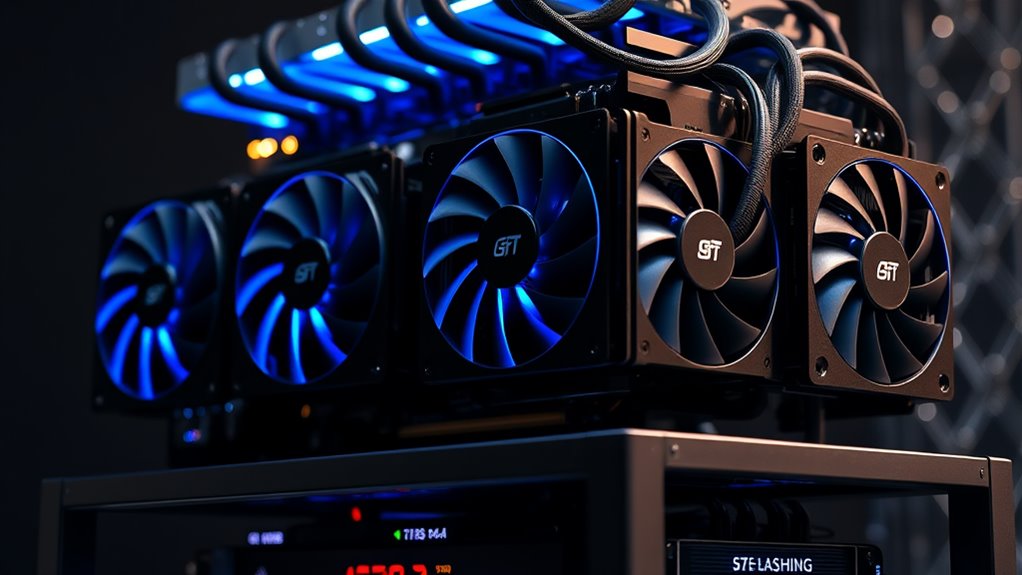Crypto Mining Explained
Note: This post may contain affiliate links, and we may earn a commission (with No additional cost for you) if you make a purchase via our link. See our disclosure for more info. The crypto world is constantly changing. This content is for informational purposes only and not financial, legal, or professional advice So, please verify the info on the cryptocurrency provider’s websites.
Crypto mining is like a high-tech gold rush. It's where computer whizzes battle it out, solving complex puzzles. Why? To validate transactions and secure blockchain networks. Simple. Miners compete to add blocks and snag rewards of shiny new coins and transaction fees. But here's the kicker—this process is power-hungry, racking up energy use comparable to whole countries. It's intense. Want to know more about the nuts and bolts behind the scenes? Keep going.

Crypto mining: it sounds like a futuristic gold rush, but it's just a bunch of tech-savvy folks with powerful computers trying to solve mind-bending puzzles. In reality, it's a grueling race to validate transactions and secure blockchain networks by cracking complex mathematical codes. The purpose? Keeping everything honest and decentralized, so no one can pull a fast one and double-spend their digital cash.
At the heart of crypto mining lies the Proof-of-Work (PoW) model. Miners pit their computational might against each other, racing to solve cryptographic hashes. The winner gets to add a block of transactions to the blockchain and earns some shiny new coins—think Bitcoin—plus transaction fees to sweeten the deal. Mining pools allow individual miners to collaborate and increase their chances of earning rewards, making the process slightly less daunting.
But don't be fooled; this isn't a walk in the park. It requires a mountain of computational power, and that means specialized hardware called ASICs. If you're not packing the latest tech, good luck—you're toast.
The hashing process is where the action happens. Miners tweak a unique number, known as a nonce, until they hit the jackpot with a target hash. Then, like clockwork, the network nodes step in to verify the block's accuracy. Nodes validate transactions and store information on the blockchain, ensuring the integrity of the entire system.
But there's a catch: every two weeks, the network recalibrates its difficulty level to keep things challenging. If more miners join the fray, it gets tougher. It's like a never-ending game of whack-a-mole, and the stakes are high. Once you've earned your crypto rewards, storing them in cold wallets offers significant protection against online threats by keeping private keys completely offline.
And let's not forget the environmental impact. Mining consumes enough energy to rival entire countries, which raises eyebrows and sparks debates about sustainability. Sure, some are advocating for renewable energy sources like solar or wind, but the reality remains grim.
As technology advances, miners scramble to stay ahead, but it feels like a hamster wheel—ever faster, ever harder, and often with a hefty power bill. In this chaotic world, one thing is clear: crypto mining isn't just a trend; it's a relentless, exhausting grind.
Frequently Asked Questions
What Hardware Is Best for Beginners in Crypto Mining?
For beginners diving into crypto mining, the Bitmain Antminer S9 is a decent starter—affordable and easy to plug in.
The Canaan Avalon Nano 3? Portable and low-noise, perfect for home use.
Looking for something that doubles as a heater? The BitChimney might fit the bill.
Just remember, mining isn't all fun and games; energy costs bite hard, and noise levels can drive anyone insane.
Welcome to the wild world of crypto!
Can I Mine Cryptocurrencies on a Laptop?
Mining cryptocurrencies on a laptop? Sure, if you enjoy wasting electricity and frying your hardware.
Laptops aren't built for that. They overheat, struggle with power, and yield almost nothing.
Sure, you could dig into altcoins like Monero, but why bother? The competition is fierce, and the rewards are tiny.
ASIC miners and dedicated rigs are the real champs. Laptops? They're just not cut out for the mining grind. Simple as that.
How Do I Choose a Mining Pool?
Choosing a mining pool? Buckle up.
Bigger pools mean more frequent, but smaller rewards. Smaller pools? They offer higher payouts, but good luck with consistency.
Check the hash rate—higher is better. Proximity to servers? It matters.
Then there's the fees. Compare 'em, or you'll regret it.
Reputation? Look for user reviews; avoid scams.
And don't forget security. If it sounds shady, it probably is.
Happy mining!
What Are the Tax Implications of Crypto Mining?
Crypto mining isn't just about virtual coins; it's a tax minefield. Rewards? Taxed as regular income, based on what the crypto was worth when you got it.
Selling your mined coins? Capital gains tax kicks in, too. Short-term, long-term—pick your poison.
And if you think you're a hobby miner, good luck deducting expenses. The IRS is watching, folks.
Is It Legal to Mine Cryptocurrencies in My Country?
Is it legal to mine cryptocurrencies in your country? Well, that depends.
In some places, like the U.S. and Canada, it's a mixed bag of regulations. Others, like China and several Middle Eastern countries, have outright bans.
Australia and New Zealand seem chill about it, though. Just remember, energy costs and taxes can bite hard.










